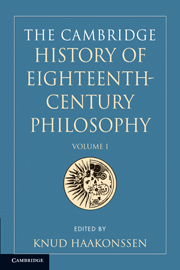Book contents
- Frontmatter
- CONTENTS
- Preface
- Methods of reference and abbreviations
- List of contributors
- I The Concept of Eighteenth-Century Philosophy
- II The Science of Human Nature
- 7 Philosophical Methods
- 8 Human Nature
- 9 Perception and Ideas, Judgement
- 10 Self-Consciousness and Personal Identity
- 11 Reason
- 12 Substances and Modes, Space and Time
- 13 Causality
- 14 Knowledge and Belief
- 15 Scepticism
- 16 Philosophy of Language
- 17 Rhetoric
- 18 Aesthetics
- 19 The Active Powers
- 20 Education
- Biobibliographical Appendix
- Bibliography
- References
11 - Reason
from II - The Science of Human Nature
Published online by Cambridge University Press: 28 March 2008
- Frontmatter
- CONTENTS
- Preface
- Methods of reference and abbreviations
- List of contributors
- I The Concept of Eighteenth-Century Philosophy
- II The Science of Human Nature
- 7 Philosophical Methods
- 8 Human Nature
- 9 Perception and Ideas, Judgement
- 10 Self-Consciousness and Personal Identity
- 11 Reason
- 12 Substances and Modes, Space and Time
- 13 Causality
- 14 Knowledge and Belief
- 15 Scepticism
- 16 Philosophy of Language
- 17 Rhetoric
- 18 Aesthetics
- 19 The Active Powers
- 20 Education
- Biobibliographical Appendix
- Bibliography
- References
Summary
It might seem evident that the Age of Enlightenment, or le siècle des Lumières or die Aufklärung, is pre-eminently the Age of Reason. But, upon further consideration, this conclusion is not so clear. First, what precisely is meant by the term reason? The old sense of mathematical proportion, enlarged to the idea of abstract reasoning? The human faculty of knowledge, generally taken, or the faculty of thinking according to rules? The order of things such as it has been fixed up by the wisdom of God or the set of the first and innate truths? Secondly, are we to examine reason as a theoretical principle or as a moral and political foundation, as a formal rule or as a determining power? Thirdly, are we able to coordinate into a consistent whole the study of the relationship between reason and the senses, between reason and the understanding, reason and the passions, reason and morality, reason and faith, or reason and enthusiasm? Now, if we want to classify the different philosophies or systems of the eighteenth century, we should be able to answer these questions and give a definition of reason which, though complex, might nevertheless be determinate. As a matter of fact, though, such an attempt is hopeless. We cannot even say that one of the main features of the eighteenth century was rationalism. It was tormented from within by scepticism; it was beset from without by such issues as experience, liberty, evil, enthusiasm, and public policy. In England and Germany, it was a deeply religious century, and it engendered and bred the first beginnings of Romanticism.
- Type
- Chapter
- Information
- The Cambridge History of Eighteenth-Century Philosophy , pp. 319 - 342Publisher: Cambridge University PressPrint publication year: 2006
References
- 1
- Cited by



